- Home
- Susanne L. Lambdin
Queen of Magic
Queen of Magic Read online
THE REALM OF MAGIC:
QUEEN OF MAGIC
by
Susanne L. Lambdin
* * * * *
PUBLISHED BY: Theogony Books
Copyright © 2018 Susanne L. Lambdin
All Rights Reserved
* * * * *
Join the mailing list and discover other titles
by Susanne L. Lambdin at:
http://www.susannelambdin.com/
* * * * *
License Notes
This ebook is licensed for your personal enjoyment only and may not be re-sold or given away to other people. If you would like to share this book with another person, please purchase an additional copy for each recipient. If you’re reading this book and did not purchase it, or it was not purchased for your use only, then please purchase your own copy. Thank you for respecting the hard work of this author.
This book is a work of fiction, and any resemblance to persons, living or dead, or places, events or locales is purely coincidental. The characters are productions of the author’s imagination and used fictitiously.
* * * * *
Book Cover by Audra Crebs
* * * * *
For Virginia.
* * * * *
Map of Caledonia
For a larger version, go to: https://susannelambdin.wixsite.com/realm-of-magic
* * * * *
Contents
Chapter One
Chapter Two
Chapter Three
Chapter Four
Chapter Five
Chapter Six
Chapter Seven
Chapter Eight
Chapter Nine
Chapter Ten
Chapter Eleven
Chapter Twelve
Chapter Thirteen
Chapter Fourteen
Chapter Fifteen
Chapter Sixteen
Chapter Seventeen
Chapter Eighteen
Chapter Nineteen
Chapter Twenty
Chapter Twenty-One
Chapter Twenty-Two
Chapter Twenty-Three
Chapter Twenty-Four
Chapter Twenty-Five
Chapter Twenty-Six
Chapter Twenty-Seven
Chapter Twenty-Eight
Chapter Twenty-Nine
About the Author
Also by Susanne L. Lambdin
Excerpt from Book One of The Milesian Accords:
Excerpt from “A Reluctant Druid:”
* * * * *
Chapter One
Tin plates hanging from leather belts clanked against armor, and helmets and shields glistened in the sunlight. The sound of marching echoed along the King’s Road, each footfall repeated twenty thousand times, and announced the arrival of the massive Garridan army. Under the command of Prince Sertorius Draconus, it remained silent when it started to rain, but when it lifted, mud squelched beneath their boots, and voices lifted in song. “Blood in the sand, blood in the surf. We came, we claimed, we the many—we the Garridan strong!”
By the first day of winter, the army had already traveled hundreds of miles on the warships of the northwestern dukedom. They had disembarked at Dreskull Castle in Thule and paused long enough to behead Prince Konall and capture the Raven Mistress before they moved on. In their sea green tunics and engraved plate mail, they offered a threat not seen in the south for centuries. No lord in his castle dared interfere, and Thule soldiers watched as the army raided farmhouses, towns, and villages, taking what they wanted. Livestock vanished, horses were seized, and any resistance from civilians ended beneath the soldiers’ swords; Prince Sertorius was going home. His destination was the royal city of Padama, besieged by his older brother, Almaric, and defended by his elderly father, King Frederick.
Sertorius’ prized prisoner, Taliesin, Mistress of the Raven Clan, lay in the back of a gut wagon, hands and ankles bound with silver chains, left to rot beside Konall’s headless body. The silver restrained her wild side, for she was Wolfen, able to turn into a beast at will, and her anger smoldered with each town or field burned by the soldiers. Sertorius was her cousin; her mother, Princess Calista, was the sister of King Frederick, but this her captor ignored. Sertorius’ goal was to subdue the King’s Men, his father’s loyal followers, and he spared none; the few King’s Men who rode out to fight were left dead on the road, creating disease.
As a Wolfen, Taliesin was immune to disease. She was a natural-born witch, a sha’tar, and her ability to cast spells required only thought, focus, and imagination, not spoken words. Her innate magic kept her from falling sick among the dead, yet her powers remained weak, as if someone had drained or put restraints on her, limiting what she could do. It might be a lack of confidence, for magic of such a magnitude was overpowering, and she remained fearful of the outcome. Try as she might, she could no more vanish from the cart and reappear back home than she could summon help from the new Raven Clan. Her exhaustion, hunger, and thirst also took their tolls, as did the smell.
The stench of the dead nobles and knights who shared her cart filled her nostrils as Taliesin hoped a stray arrow would find a home in Sertorius’ eye socket. Konall’s corpse lay stiff to one side, and the late Sir Ricard on the other. As the clouds withdrew, the sun heated the ground and baked the dead; Erindor was in the south, where it never snowed, and temperatures remained warm throughout the year.
Taliesin grimaced as a nasty black fly bit her neck. The earlier rain had offered a small relief to her thirst, and she closed her eyes with a sigh. The wagon hit a rut in the road and bounced the bodies, and a scream lodged in her throat. She refused to cry out for help, instead concentrating on what she knew about Erindor. Camel races, grand temples, exotic gardens, and palatial estates made it one of the most beautiful dukedoms in Caladonia. At least, it was before the Garridan army arrived.
Taliesin had gone to great lengths to find the most powerful magical sword in history, Ringerike, the Raven Sword. She was the heir of King Korax, the Raven King, born one thousand years ago; Ringerike had been his and now it was hers. Sertorius had taken the sword when she was captured at Dreskull Castle, but it would not serve him; if he tried to use it, she had no doubt he would die as Prince Tarquin had, for Ringerike served only the Sanqualus family, and she was the last of their line. She always suspected Prince Sertorius meant to restore magic to the realm, something they had in common, for it was what she wanted too. Without the Raven Sword in hand, though, she suffered. The sword gave her confidence; it was everything to her, the source of her strength, but here she was, in a gut wagon, surrounded by the putrescent odor of death, unable to imagine a way out of the situation. Her companions were dead noblemen Sertorius had collected like trophies left to spoil in the sun.
“I can’t last another day,” Taliesin groaned.
At the sound of her voice, a tiny red spider stepped lightly upon its slick silken strands to rework the damage caused by the rain. She liked the spider and its web—they kept the flies away. A drop of water fell onto her nose and slid down her cheek, a small distraction that helped her to ignore the horses as they clomped along, the rattle of the wagon, and the muttering of the driver.
She concentrated on the noises outside the wagon, the little sounds, barely noticeable over the heavy footfalls. Crickets chirped in the tall grass. Four Knights of Chaos rode beside the wagon, and the grass brushed the legs of their horses, a constant swish-swish which sounded oddly comforting. She also heard the rhythmic croaks of a nearby bullfrog, which meant the army was close to fresh water.
She took a deep breath and concentrated on the four knights. A simple magic trick she knew, a quick probe into their thoughts, might allow her to make one of the knights sympathetic to her plight. She hadn�
��t tried it before, since the knights came and went as needed by their prince, and the driver of the wagon was a dullard. A day ago, she had convinced the driver to turn off the road; he had done so, only to return with more bodies to fill the wagon. The driver lacked intelligence; he was as dead inside as those he delivered to Padama; however, the knights were different; they were men of deep thoughts, and she took hope when she felt a nibble.
Sir Morgrave responded because he was bored. As light as the spider on its web, Taliesin tiptoed through Morgrave’s thoughts and penetrated the layers of hatred, conceit, and prejudice instilled in the Knights of Chaos from the day they took the service oath as young squires. It took effort to instill doubt and guilt, but she inserted an image into his head. His treatment of a poor, helpless woman, sprinkled with a desire for compassion, earned a fast response.
“Sir Barstow, I do not think the Raven Mistress should be trussed up like a chicken,” Morgrave said. “If she dies, Prince Almaric will punish us all. After all, she is his intended bride. Sertorius brings this army to Almaric, who gave specific orders the Raven Mistress was not to be harmed. We failed to capture Prince Konall alive, and if she dies before we reach Padama, Almaric will attach our heads to spikes. We should release the Raven Mistress while she still lives.”
“No,” Sir Barstow muttered. He presented a wall Taliesin was unable to break. His thoughts were focused on carnage; he lived for the thrill of battle and did not care if she lived or died. Nor did he care what Almaric wanted; he was loyal to Sertorius.
Taliesin moved onto the next knight, Sir Gallus, and squeezed his brain like a piece of soft cheese. He thought about his wife and three young daughters, left behind in Garridan, far on the northeastern coastline. He missed his family and their home by the sea. During his travels, he had contracted a persistent genital rash, and the guilt of his unfaithfulness broke him.
“Sertorius has lost all sense of reason,” Sir Gallus said in a surly tone. “We all know the Raven Mistress refused to wed the prince, which is the only reason Sertorius is treating his former sweetheart like a commoner. I agree with Morgrave, for we are honorable knights and must, therefore, show mercy.”
“Since when do any of you care about honor? We are the Knights of Chaos! We have our orders. No means no,” Barstow barked.
Taliesin ignored the blustery knight, and worked her way into Sir Duroc’s head, as patient as the little red spider as she created an intricate web of emotions in his mind. Duroc responded the best to shame. His mental resistance collapsed as he gazed at Taliesin’s miserable condition, imagined himself in a similar situation, and sought to delay their progress in order to convince their leader to change his mind.
“A banner has risen up ahead,” Duroc said. “Do you not see it held aloft by a rider, Sir Barstow? It means we have thirty minutes to rest, and I, for one, have a sore backside. The rest of you must be tired of clanking about in your armor, and I am certain the Raven Mistress needs water, food, and shade.”
Sir Barstow swore under his breath. “Heggen’s Teeth! That again,” he grumbled. “You three nag me like nursemaids. Dismount. Water your horses. Get something to eat. Do no not mention the prisoner again, or I’ll knock the piss out of you with a punch to your bladder.”
“Barstow, you are cruel,” Duroc said. “I am going to tend to her needs.”
“You will do no such thing,” Barstow snarled. “Let the Raven Mistress lie in her own filth. It’s her own fault she’s in a gut wagon, and not riding in style with Prince Sertorius and Princess Calista. The girl should not have spurned the prince; he wanted to marry her, but she thinks she’s too good for him.”
Taliesin was not surprised Sir Barstow continued to resist; he was Sertorius’s most trusted knight and a close friend. He would have given his life to save the prince, and he wasn’t about to disobey a direct order, not even with her wiggling about in his mind trying to remind him that she, too, had Draconus blood.
The long column of soldiers came to a halt, and the wagon pulled off to the side of the King’s Road. The four knights dismounted, clanking in their armor, and stretched their arms and legs. One of their horses snorted, and a hot rush of urine from Barstow’s horse splashed on his steel-encased feet.
“It’s just not my lucky day,” the knight muttered.
She again probed Barstow’s mind, thick like a pudding, resistant, and filled with years of hatred toward the Raven Clan. Barstow relieved himself on the side of the road, his thoughts on Prince Almaric and the Wolf Clan, neither of whom he liked, and wondered if Sertorius meant to claim the throne for himself.
Taliesin hated the Wolf Clan more than either the prince or her captors. For centuries they had encroached on the Raven Clan’s rights to collect weapons, armor, and personal items from the dead, left behind on battlefields. Chief Lykus was their leader, and he had personally eaten the Raven Master, Osprey, and seen to the destruction of the Raven Clan. He had ordered Captain Wolfgar to pursue Taliesin and turn her into a Wolfen. Wolfgar had been successful, but it was Lykus’ son and heir, Phelon, who forced Taliesin to drink human blood, the only way for the bitten to transform into a beast.
Barstow had seen Wolfmen feed on the flesh of humans and had witnessed dark rituals conducted at the full moon. Almaric was Wolfen. Barstow believed Varguld, the Age of the Wolf, was upon them, and feared one would turn him into a Wolfen. As long as Sertorius told him to fight for Almaric, he would, but he did not want Almaric, the Wolf Prince, to sit on the Ebony Throne. Nor did he want every man, woman, and child in Caladonia to run on all fours, bay at the moon, and feed on the weak. He hated Almaric and Chief Lykus more than he disliked Taliesin, but he considered killing her so he could ride ahead and join the rest of his order. She broke contact when he pictured himself strangling her, and took several deep breaths, feeling both thirst and the need to relieve herself, but she wasn’t about to pee in her pants again. Her thoughts mingled with Morgrave’s, and she thought of her sword, Ringerike.
“I am worried, Barstow,” Sir Morgrave grumbled as he urinated on the grass. “I am the one who carries the Raven Sword, and it burned a hole right through my saddle. I am lucky it didn’t burn the flanks of my horse. The sword whispers to me—it wants to be with the Raven Mistress.”
“We should give the sword to her,” Sir Duroc said. An older man with a gray beard and a crooked nose, he peered over the side the wagon and met Taliesin’s gaze. “I say we release the girl and let her take the sword with her. They say the sword is cursed, that it can kill a man for simply thinking ill of the Raven heir. A hole in Morgrave’s saddle is better than one in our skulls.”
Sir Barstow pounded his fist against the side of the wagon. “I say we follow orders, so shut your holes,” he snarled. “You are starting to wear thin on my nerves. The next man who suggests we release this filthy scavenger will feel my boot up his backside!”
“I see no reason to be rude, Barstow,” Sir Gallus replied. He appeared at the back of the wagon, while the driver went about his business. His black hair lay damp on his brow, and he wrinkled his nose in disgust. “She’s a Draconus princess. This is wrong, and you know it. No lady should be treated this way.”
“If she dies, Sertorius will have our heads,” Duroc added.
Taliesin raised her head as the four knights gathered beside the wagon to look at her. Her stomach rumbled. At Dreskull Castle, four days ago, she had eaten a meager meal. Since then, they had covered more than three hundred miles, and she had not eaten anything else. Barstow nodded, and his friends led their horses to a nearby creek. The slosh of water told Taliesin the driver used a bucket to water his horses, and she licked her dried lips. The knights’ voices carried to her on the breeze, along with the odor of fresh horse manure, ripe and pungent. The smell was pleasant, compared to the stench in the wagon.
“The girl is not going to live another day without food and water, Barstow,” Morgrave argued. “I cannot in good conscience allow this brutality to continue.”
/> “When did you three heroes start giving a damn about the Raven Mistress?” Barstow asked. “Sertorius no longer loves her. I know you may have heard the rumors that she is his cousin, Rosamond Mandrake, and she’s the daughter of the King’s sister, Princess Calista. The old bitch rides in a carriage. Calista doesn’t care about the girl, so why should we? Give me one good reason, and I’ll consider letting her go. Just one.”
“Almaric wants to marry her; it is not uncommon for first cousins to wed,” Morgrave said, persistent in his crusade to free her. “You have heard the rumors. The king sent Calista to live with the nuns at Talbot Abbey when he learned she was pregnant. That girl is Calista’s child, and her father was John Mandrake, the famous swordsmith. For years, Taliesin lived in secrecy with the Raven Clan. They say she’s a witch. Now, her mother returns to the royal court, and the daughter is left to rot in a wagon. Have you noticed the carnal way the old hag looks at us? It makes me uncomfortable, and I am not a man who readily turns down what a woman has to offer.”
“Because you have no standards,” Barstow replied. “Mind what you say, for you are speaking about Princess Calista.”
“Oh, yes, I do,” Morgrave said. “You wanted one good reason, and I gave you one. If the girl dies, Prince Almaric will kill us. I don’t care what you say, Barstow. I feel sorry for the girl, though Sertorius and her mother do not. You’ll be sorry after Almaric throws us to the wolves, but by then, it will be too late to do anything about it.”

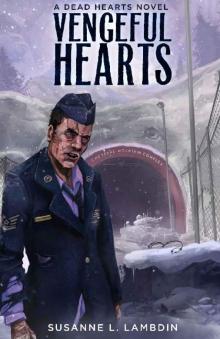 Vengeful Hearts (Dead Hearts Book 3)
Vengeful Hearts (Dead Hearts Book 3)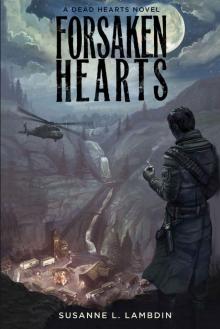 Dead Hearts (Book 2): Forsaken Hearts
Dead Hearts (Book 2): Forsaken Hearts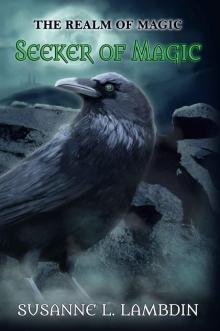 Seeker of Magic
Seeker of Magic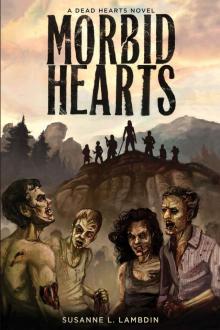 Morbid Hearts (Dead Hearts Book 1)
Morbid Hearts (Dead Hearts Book 1)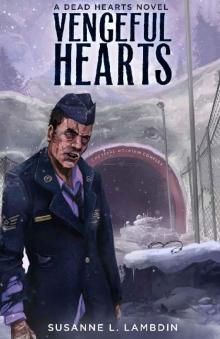 Dead Hearts (Book 3): Vengeful Hearts
Dead Hearts (Book 3): Vengeful Hearts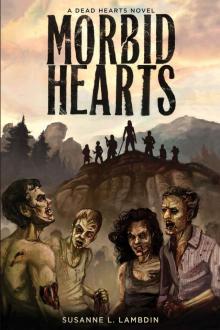 Dead Hearts (Book 1): Morbid Hearts
Dead Hearts (Book 1): Morbid Hearts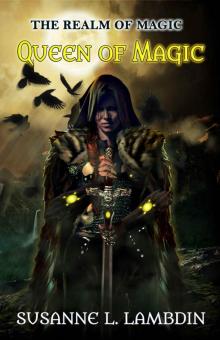 Queen of Magic
Queen of Magic